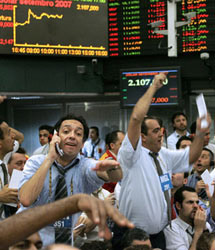 |
 |
 |
 Business News | August 2007 Business News | August 2007  
Global Markets Keep Tumbling
 Associated Press Associated Press
go to original


| | Brazilian traders work on the floor of the Mercantile and Futures Exchange in Sao Paulo. Brazil's stock market fell to its lowest level since April as investors sold off risky emerging market securities as concerns grew over the US credit markets. (Mauricio Lima/AFP) |
London - Global stock markets tumbled again Thursday on persistent worries about U.S. housing loan problems and potential damage to the global economy.

The slides, which increased after U.S. markets fell again, came despite moves by the U.S. Federal Reserve to add more cash to the banking system and action by other central banks since last week that still failed to calm investors' nerves.

In London the FTSE 100 lost 4.1 percent - or 59.8 billion pounds ($119.14 billion) in the value of Britain's biggest companies - as it fell past the 6,000 mark to close at 5,858.9, its lowest point since September 2006. France's CAC-40 declined 3.3 percent to 5,265.47, its lowest level this year, and Germany's DAX index fell 2.4 percent to 7,270.07.

"Investors continue to flee from anything that smells of risk, even the tiniest bit," said Jay Bryson, global economist with Wachovia in Charlotte, North Carolina.

"There could be further losses to come," said Scott Scrase, a trader at CMC Markets.

The benchmark Nikkei 225 index closed down nearly 2 percent on the Tokyo Stock Exchange after falling below the key 16,000-point mark the first time since November. South Korea's main benchmark fell 6.9 percent, the greatest point drop ever, to record its lowest close since May. Hong Kong's blue chip Hang Seng Index dropped 3.3 percent to its lowest close in two months.

There was heavy selling in markets across Latin America that traders attributed to investor fears of a global credit crisis.

Mexico City stock market's IPC index of leading issues shed 4 percent after losing 2.6 percent on Wednesday. In Brazil, the Sao Paulo stock market's benchmark Ibovespa stocks index lost 6 percent, following to Wednesday's 3.2 percent decline.

Argentina's benchmark Merval index sank 7 percent after shedding 5.2 percent in the previous session and Chile's Ipsa blue-chip index was down 5.5 percent following Wednesday's market holiday.

Before the market opened in the U.S., troubled mortgage lender Countrywide Financial Corp. revealed it would have to draw on an $11.5 billion credit line to fund its operations, with money increasingly hard to come by in tightening credit markets.

Also Thursday, the New York Fed, which carries out the central bank's market operation, injected $17 billion into the banking system in two operations. That infusion comes on the heels of a Wednesday "repo" of $7 billion, in which it buys that amount in securities from dealers, who then deposit the money into commercial banks.

Central banks around the world have been supplying billions of funds to banks in the past week to make cash available for lending and keep interest rates from rising amid signs that credit was drying up.

Repercussions from the U.S. credit crisis rippled across Asia, where at least three markets lost more than 6 percent on the day.

That's because of uncertainty over the size of impact on corporate earnings and the regional economy, said Shinichi Ichikawa, chief strategist at Credit Suisse. He said the weakness of the dollar and the euro also fueled the concerns.

"The issue of the subprime loans is not just the problem of that sector but it also affects many related financial products, (and) the size of a possible damage or other details are not clear, and that's why investors are feeling uneasy," Ichikawa said.

Stocks plunged Thursday in the U.S., with the Dow Jones industrial average down 2.47 percent to 12544.03. The index fell more than 300 points in afternoon trading, after closing below 13,000 on Wednesday for the first time since April 24. Broader stock indicators were also lower.

"All of Asia and other European markets are watching the U.S. market," said James Soh, a strategist at Korea Investment & Securities Co. in Seoul. Global investors were focused in particular on the U.S. Federal Reserve, he said.

Some investors have been calling for the U.S. central bank to free up more cash by making an interest rate cut at its Sept. 18 meeting.

The Bank of Japan injected 400 billion yen ($3.4 billion) into money markets Thursday, the third time since last Friday it has acted in a bid to curb rises in a key overnight interest rate.

In the face of measures taken by central banks across the globe, banking issues were pummeled.

HSBC Holdings PLC, Europe's largest bank by market value, fell 2.5 percent in London. Man Group PLC, the world's largest publicly traded fund manager, dropped 8.3 percent, and Standard Chartered bank, which does much of its business in Asia, declined 7.6 percent.

Deutsche Bank fell 1.9 percent in Frankfurt while BNP Paribas - which last week froze three funds that had invested in the U.S. home loan market - was off 3.1 percent.

Metals futures also traded lower, with Rio Tinto down 7 percent, Xstrata off 6.5 percent, Kazakhmys falling 8.5 percent and Vedanta Resources declining 8.4 percent.

In Germany's export-driven economy, some big decliners were automaker DaimlerChrysler, down 4.7 percent, gas producer Linde AG falling 3 percent and tour package operator TUI AG off 8.3 percent.

Associated Press writers Mari Yamaguchi in Tokyo and Matt Moore in Frankfurt, Germany, contributed to this report. | 
 | |
 |



